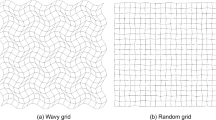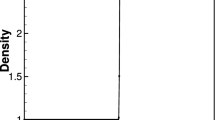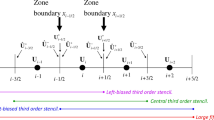Abstract
Concerning the satisfaction of free-stream preservation which reduces errors in the numerical evaluation of grid metrics, the nonlinear central schemes based on WENO interpolations are preferable because of their easy achievement of preservation even on distorted grids, whereas the preservation is hardly achieved by canonical WENO schemes due to their nonlinear upwind nature. However, the latter are typically robust in terms of capturing shocks on uniform or smooth grids, whereas the former are sometimes liable to numerical instability. Aiming at above predicaments, an upwind-biased approach in the presence of flux splitting is established by integrating two seemingly distinct techniques, WENO interpolation and reconstruction, and meanwhile free-stream preservation and increased robustness are acquired. Specifically, the proposed recipe consists of variable and corresponding flux at one midpoint as well as fluxes at sets of nodes as that in WENO; WENO interpolation is cast to derive the former and WENO reconstruction is implemented using the latter to incarnate their contribution; results by two nonlinearities are hybridized carefully and the target order can be achieved. The developed schemes include third-, fifth-, and seventh-order nonlinear methods. By the way, a WENO implementation with the free-stream preservation is obtained as a special case of the proposed method. Numerical examples are used to validate the third- and fifth-order schemes. The achievement of free-stream preservation property is testified (including the aforementioned WENO implementations). 1-D problems by Euler equations indicate the capability of proposed schemes to resolve shock discontinuities and their good resolution. In 2-D situation, vortex preservation and double Mach reflection problems on uniform and randomized grids are chosen, and the computation on the latter grids has been known to accomplish only if free-stream preservation is satisfied. The proposed schemes produce well results in both cases. Comparative studies demonstrate the accuracy and increased robustness of the newly developed schemes for solving flow problems under non-smooth grids.














Similar content being viewed by others
Data availability
Enquiries about data availability should be directed to the authors.
References
Jiang, G.S., Shu, C.-W.: Efficient implementation of weighted ENO schemes. J. Comput. Phys. 126, 202–228 (1996)
Lele, S.K.: Compact finite difference schemes with spectral-like resolution. J. Comput. Phys. 103, l6-42 (1992)
Visbal, M.R., Gaitnonde, D.V.: On the use of high-order finite-difference schemes on curvilinear and deforming meshes. J. Comput. Phys. 181, 155–195 (2002)
Nonomura, T., Lizuka, N., Fujii, K.: Freestream and vortex preservation properties of high-order WENO and WCNS on curvilinear grids. Comput. Fluids 39, 197–214 (2010)
Deng, X., Jiang, Y., Mao, M., Liu, H., Li, S., Tu, G.: A family of hybrid cell-edge and cell-node dissipative compact schemes satisfying geometric conservation law. Comput. Fluids 116, 29–45 (2015)
Thomas, P.D., Lombard, C.K.: The Geometric Conservation Law – A link between finite-difference and finite-volume methods of flow computation on moving grids, AIAA 78-1208.
Thomas, P.D., Neier, K.L.: Navier-Stokes simulation of three-dimensional hypersonic equilibrium flows with ablation. J. Spacecr. Rocket. 27, 143–149 (1990)
Vinokur, M., Yee, H.C.: Extension of efficient low dissipation high order schemes for 3D curvilinear moving grids, NASA Technical Memorandum 209598 (2000)
Deng, X., Mao, M., Tu, G., Liu, H., Zhang, H.: Geometric conservation law and applications to high-order finite difference schemes with stationary grids. J. Comput. Phys. 230, 1100–1115 (2011)
Nonomura, T., Fujii, K.: Robust explicit formulation of weighted compact nonlinear scheme. Comput. Fluids 85, 8–18 (2013)
Jiang, Y., Shu, C.-W., Zhang, M.-P.: Free-stream preserving finite difference schemes on curvilinear meshes. Methods Appl. Anal. 21, 1–30 (2014)
Li, Q., Sun, D., Xu, F.: WENO interpolation-based and upwind-biased free-stream preserving nonlinear schemes, Adv. Appl. Math. Mech. https://doi.org/10.4208/aamm.OA-2020-0170 [also in Q. Li and D. Sun, WENO interpolation-based and upwind-biased schemes with free-stream preservation, http://arxiv.org/abs/1810.11103, 2018].
Nonomura, T., Terakado, D., Abe, Y., Fujii, K.: A new technique for freestream preservation of finite-difference WENO on curvilinear grid. Comput. Fluids 107, 242–255 (2015)
Li, Q., Sun, D., Liu, P.: Further study on errors in metric evaluation by linear upwind schemes with flux splitting in stationary grids. Commun. Comput. Phys. 22, 64–94 (2017)
Zhu, Y., Hu, X.: Free-stream preserving linear-upwind and WENO schemes on curvilinear grids. J. Comput. Phys. 399, 108927 (2019)
Kim, K.H., Kim, C., Rho, O.-H.: Methods for the accurate computations of hypersonic flows I. AUSMPW+ scheme. J. Comput. Phys. 174, 1 (2001)
Deng, X., Zhang, H.: Developing high-order weighted compact nonlinear schemes. J. Comput. Phys. 165, 22–44 (2000)
Li, Q., Guo, Q., Zhang, H.: Analyses of the dispersion overshoot and inverse dissipation of the high-order finite difference scheme. Adv. Appl. Math. Mech. 5, 809–824 (2013)
Shu, C.-W.: High-order weighted essentially nonoscillatory schemes for convection dominated problems. SIAM Rev. 51, 82–126 (2009)
Yan, Z., et al.: Development of 3rd-order HWCNS and its application in hypersonic flow. Acta Aeronaut. Astronaut. Sin. 36, 1460–1470 (2015)
Henrick, A.K., Aslam, T.D., Powers, J.M.: Mapped weighted essentially non-oscillatory schemes: achieving optimal order near critical points. J. Comput. Phys. 207, 542–567 (2005)
Li, Q., Liu, P., Zhang, H.: Piecewise polynomial mapping method and corresponding WENO scheme with improved resolution. Commun. Computat. Phys. 18, 1417–1444 (2015)
Acknowledgements
This study is sponsored by the project of National Numerical Wind-tunnel of China under the Grant No. NNW2019ZT4-B12, and is also co-supported by the National Natural Science Foundation of China under the Grant No. 11802324.
Author information
Authors and Affiliations
Corresponding author
Ethics declarations
Conflict of interest
The authors have not disclosed any competing interests.
Additional information
Publisher's Note
Springer Nature remains neutral with regard to jurisdictional claims in published maps and institutional affiliations.
Rights and permissions
About this article
Cite this article
Li, Q., Sun, D., Yan, P. et al. Nonlinear Upwind-Biased Free-Stream-Preserving Schemes for Compressible Euler Equations. J Sci Comput 91, 72 (2022). https://doi.org/10.1007/s10915-022-01833-8
Received:
Revised:
Accepted:
Published:
DOI: https://doi.org/10.1007/s10915-022-01833-8




